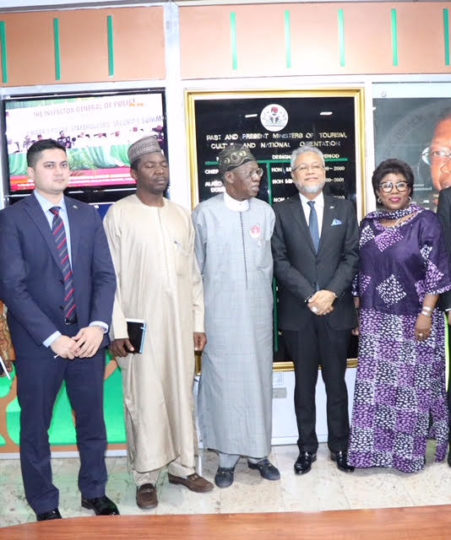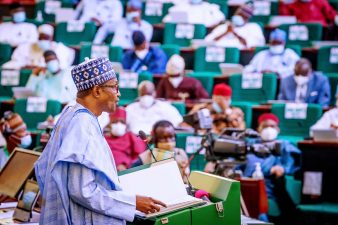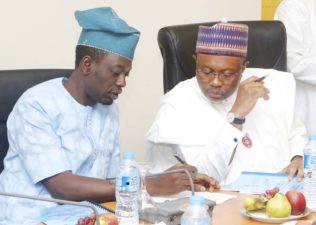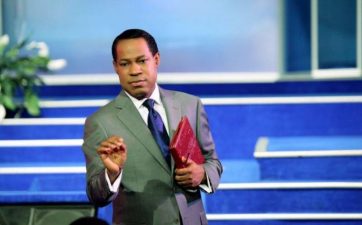Following a request by Godwin Obaseki, theGovernor of Edo State, President Buhari has expressed a willingness to grant apresidential pardon to the late Professor Ambrose Alli, former Governor ofBendel State (now Edo and Delta States). Alli was removed from office by Buhariat the end of 1983, and sentenced to 100 years in prison by a military tribunalfor allegedly misappropriating ₦983,000 in funds for a road project. He wasfreed when the Esama of Benin, Gabriel Igbinedion, paid a fine on his behalf.Tragically, Alli passed away on his 60th birthday, 22 September 1989, at theLagos University Teaching Hospital.
The Minister of
Information and Culture, Alhaji Lai Mohammed, has said the present
administration’s efforts at improving security and upgrading infrastructure is
a deliberate policy to promote tourism in Nigeria.
The Minister, who stated this when he received the Secretary-General of the
D-8, Mr. Dato’ Ku Jafafar Ku Shaari, on a courtesy visit to his office in Abuja
on Tuesday, noted that without the provision of security and critical
infrastructure, tourism development will remain a mirage.
“Without peace and security, the best tourist attractions will be inaccessible
to anybody. As a matter of fact, without peace and security and stability,
travel advisories will actually discourage or even prohibit tourists from
coming into those areas and the people don’t invest really in the areas where
there is instability or insecurity. That is why the government has made it a
cardinal principle to address the issue of insecurity in the country,” he said.
Alhaji Mohammed said in spite of the recent setbacks in the fight against
insurgency in the country, the government has succeeded in banishing Boko Haram
to the fringes of Lake Chad, from where they carry out cowardly attacks.
He said before the advent of the Buhari Administration, a large chunk of
Nigeria’s territory, including 20 out of the 27 Local Government Areas in Borno
State, was under the effective control of Boko Haram.
The Minister also said before the Administration assumed office, Boko Haram
could stroll into the Federal Capital Territory to carry out deadly attacks,
but that the reverse is the case now.
“Today after three years, we have had no single incident of any insurgency in
Abuja or its environs,” he said.
Alhaji Mohammed said President Buhari has succeeded in mobilizing regional
support to ensure the comprehensive defeat of Boko Haram in the Sahel Region.
On the provision of infrastructure, he said the Administration has invested
N2.7 trillion in infrastructure within two years.
“Your Excellency, you cannot have tourism without infrastructure. There must be
roads, airports, power. Without these things, you can’t even access the tourist
attractions and it’s on record that this government has in the last two years –
2016-2017 – invested massively in infrastructure,” he said.
The Minister assured that Nigeria is poised to take advantage of its membership
of the D-8 to advance its tourism sector.
In his remarks, the Secretary-General of D-8 said he and his team were in the
ministry to secure the input of the government towards the development of a
strategic vision on how member countries can share experiences and knowledge on
tourism.
“The purpose of our visit today to the ministry is to learn from the government
and the ministry in all the activities in respect of culture and tourism and
where we can connect as an organisation,” he said.
He commended the Nigerian government for its efforts towards the development of
tourism, especially the provision of security and critical infrastructure as
well as the introduction of Visa On Arrival for tourists.
A pardon or prerogative of mercy is a right recognised under the 1999 Constitution, and should ordinarily, if properly exercised, be greeted with applause and gratitude to the President when extended to deserving persons who have been convicted of any offence and have exhausted the appeals process, irrespective of the gravity of the offence or the severity of punishment meted to the offender.
A pardon is granted after consultation with the Council of State, which comprises of the President, Vice President, all state governors, former Heads of State, all former Chief Justices of Nigeria, the National Assembly leadership, and the Attorney-General of the Federation, and could be granted posthumously.State Governors or the President have constitutional powers to grant conditional or unconditional pardon to a convict, or to substitute, reduce, commute or remit the length of sentence and/or the severity or quantum of punishment and penalty or forfeiture, imposed on that person by a court of law.
The legal effect of a pardon is very profound and far reaching to a beneficiary, as it exempts, frees and releases the convict of all liabilities or disabilities flowing from his conviction completely purging the person of the pariah status, infamy and ignoble toga of an ex-convict under the law.
However, as a special kind of power held in public trust by the Chief Executive, the power to pardon it ought to be exercised with the highest sense of responsibility, probity and circumspection by the person vested with such powers in order to ensure that the critical balance between the rights of the individual concerned and the corresponding right of the public to good order, decency, peace and security, is maintained, to meet the ends of equity, justice and good conscience at all times. Nigeria’s leaders, regrettably, have a history of using pardons as political tools, and in the process, letting some truly awful people free.
In 1967, Lt. Col. Odimegwu Ojukwu led rebel forces in a 30-month war against the Nigerian state, and following defeat in 1970, went into exile, returning to Nigeria following a pardon in 1982. It was a cynical political move by President Shagari, who was hoping to get the Igbo vote in 1983’s elections.In 1998, Olusegun Obasanjo, accused of coup plotting by Sani Abacha, was pardoned by General Abudulsalami Abubakar. General Abubakar, like Shagari before him, was being cynical. The military brass at the time had decided that Obasanjo, who went on to become the democratically elected president of Nigeria the next year, was more palatable than whoever the various pro-democracy groups would throw up.
Obasanjo on his part did not use the pardon as expected by many political observers, and those who were charged and imprisoned with him, as well as Ken Saro-Wiwa and the ‘Ogoni Nine’, were never granted pardons by him, except for that granted Major Bilyaminu Mohammed.On Tuesday, March 12, 2013, the granting of prerogative of mercy by President Goodluck Jonathan, to some high profile ex-convicts sparked off anger. Of the eight pardons granted, the most talked about was that of ex-Governor D.S.P. Alamieyeseigha of Bayelsa state, who jumped bail in the UK in 2005 but was later convicted of money laundering in Nigeria. This move was seen by many as politically motivated since Alams was GEJ’s benefactor, and one of the collaterals was the pardon of ex-Major Bello Magaji, who was convicted of sodomy with little boys. In what kind of country does a child rapist get a presidential pardon?
A similarity (using state instruments for political gain) can be seen in President Buhari’s conferment of the GCFR title on Moshood Abiola on June 12, 2018, a move seen in many quarters as politically motivated to buy the loyalty and support of people from the South-West. To be clear, granting pardons is at the discretion of the President, after due consultation with the Council of State. Unfortunately, as this brief historical excursion has shown, while granting pardons are within his rights, it is clear that pardons are a useful political tool.
There are speculations the granting a pardon to Ambrose Alli is to appease parts of the South-South ahead of the 2019 Presidential election. While Alli’s family will probably be consoled by their patriarch’s name being cleared, I wonder how they will feel about the fact that the same man who sullied their patriarch’s reputation in the first place, may end up “clearing his name” in order to score a political goal.
*This was first published in The Guardian on October 15, 2018.




